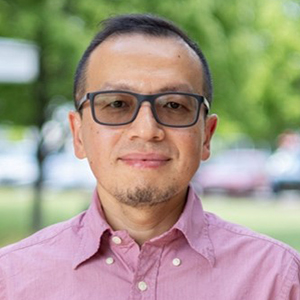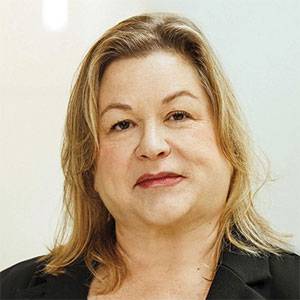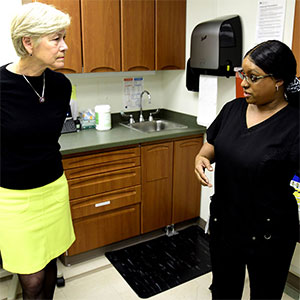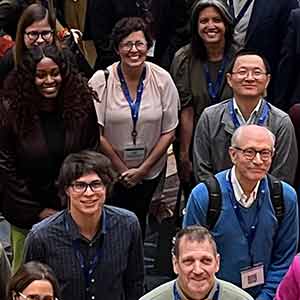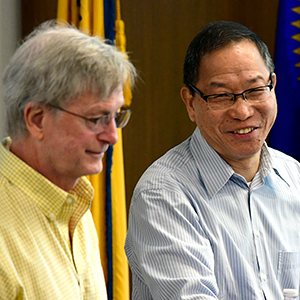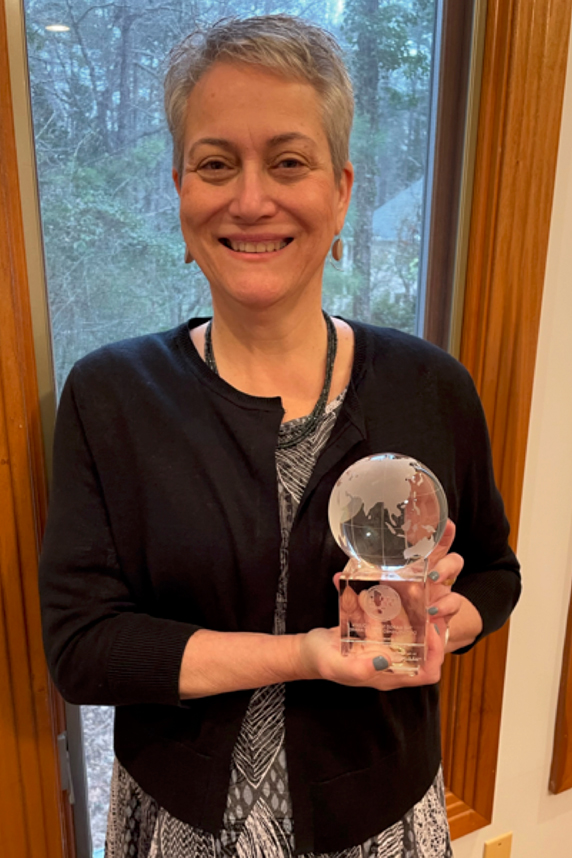 “I was introduced to MBCC back in the 1990s, when we were all beginning our journey to discover how environmental exposures might impact a woman's risk for breast cancer,” said Collman, shown here holding her award. (Photo courtesy of Gwen Collman)
“I was introduced to MBCC back in the 1990s, when we were all beginning our journey to discover how environmental exposures might impact a woman's risk for breast cancer,” said Collman, shown here holding her award. (Photo courtesy of Gwen Collman)Gwen Collman, Ph.D., acting deputy director of NIEHS, received the inaugural Margo Simon Golden Distinguished Service Award from the Massachusetts Breast Cancer Coalition (MBCC) on Jan. 20.
The award honors the legacy of Golden, who served as MBCC board president for nearly a decade. She died from breast cancer last year. The ceremony took place during the organization’s first annual Margo Simon Golden Memorial Webinar, which included an in-depth discussion about per- and polyfluoroalkyl substances, or PFAS.
Understanding the science of breast cancer
“It is an honor and a privilege to become the first recipient of this award,” Collman told attendees. “I admired Margo’s appreciation of the role of environmental exposures in the development of breast cancer how she fought to change how so many people think about breast cancer prevention.”
Among other efforts to increase scientific knowledge about the disease, Collman developed the NIEHS Breast Cancer and the Environment Research Program, which launched in 2003.
“Translational partners such as [MBCC] are so important,” noted Collman. “They help ensure [that] the results of studies make their way into the hands of those who deserve to know and can do something. They interpret ‘science speak’ to their peers and to the policymakers who need to know and have the ability to act on this evidence.”
Advancing research through community engagement
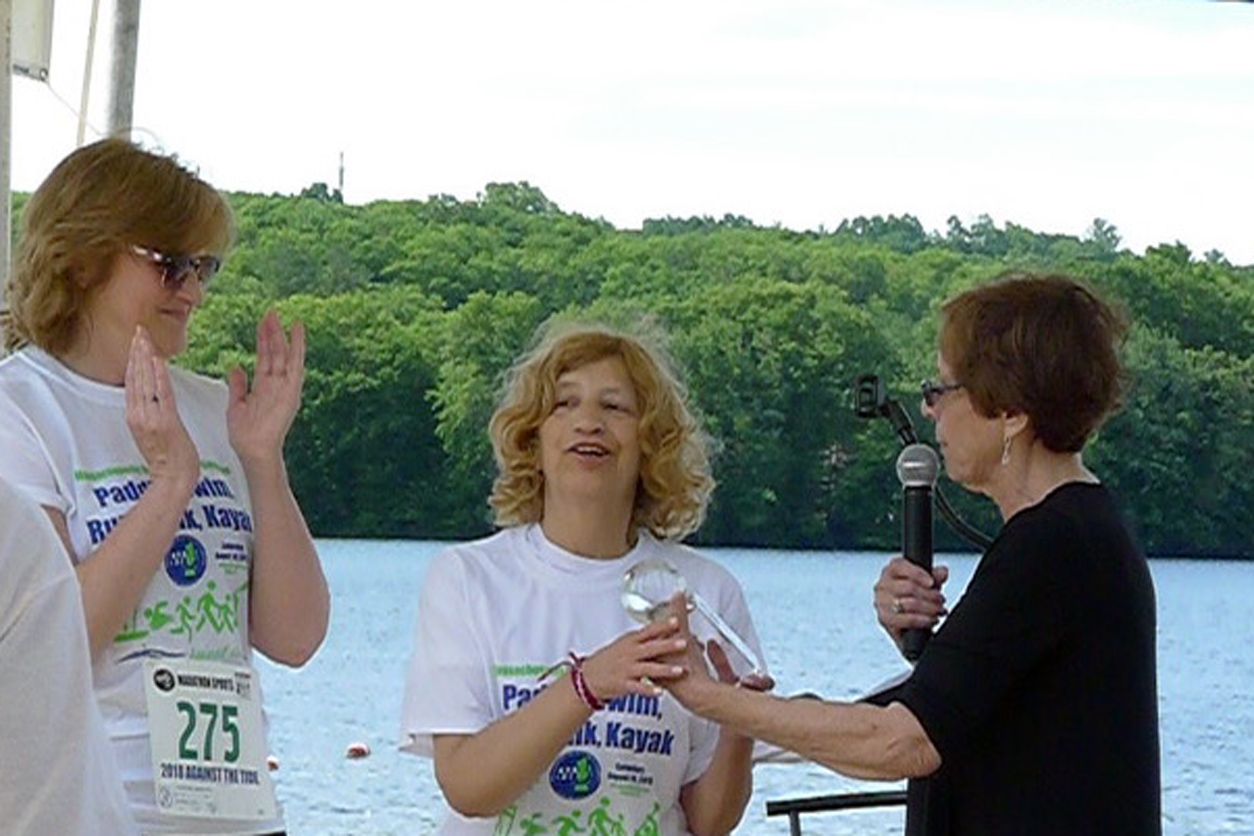 MBCC Executive Director Cheryl Osimo, right, presented Margo Simon Golden, middle, with an appreciation award for her many years of dedication to breast cancer prevention during the 26th annual Against the Tide fundraising event in 2018. On left, MBCC Board President Barbara Malkas, Ed.D., looks on.
MBCC Executive Director Cheryl Osimo, right, presented Margo Simon Golden, middle, with an appreciation award for her many years of dedication to breast cancer prevention during the 26th annual Against the Tide fundraising event in 2018. On left, MBCC Board President Barbara Malkas, Ed.D., looks on.MBCC is involved in community outreach efforts for two NIEHS-funded initiatives.
- The Sources, Transport, Exposure, and Effects of PFAS Superfund Research Program Center is housed at the University of Rhode Island.
- PFAS Research, Education, and Action for Community Health is led by the Silent Spring Institute, a nonprofit research organization dedicated to understanding how the environment influences breast cancer.
In the early 1990s, MBCC founded Silent Spring following reports of high incidence of breast cancer in Cape Cod, Massachusetts. Since then, Silent Spring has become a national leader in advancing research into the disease.
Recently, a paper by NIEHS-funded scientists at Silent Spring examined how common chemicals can increase hormones and breast cancer risk. The publication was selected as a 2021 Paper of the Year by NIEHS leaders. Learn more about the organization and its executive director Julia Brody, Ph.D., in this 2019 NIEHS Story of Success.
Focus on PFAS
Collman’s award presentation was preceded by a panel discussion on PFAS in food packaging. PFAS are manmade chemicals used in a variety of industrial and commercial products, such as nonstick cookware, personal care products, stain resistant fabrics, and firefighting foam. In food packaging, they confer resistance to grease, oil, water, and high temperatures. Known as forever chemicals, PFAS build up in our bodies and do not break down in the environment.
Participants included Arlene Blum, Ph.D., executive director of the Green Science Policy Institute; Laurel Schaider, Ph.D., senior scientist at the Silent Spring Institute; and Maricel Maffini, Ph.D., environmental health scientist and independent consultant. They discussed topics such as PFAS regulation, how states and businesses are responding to the problem of exposure, and what people can do to avoid the substances.
A full recording of the event, including Collman’s remarks upon receiving this prestigious award, is provided below.
An Update on PFAS in Food Packaging
(John Yewell is a contract writer for the NIEHS Office of Communications and Public Liaison.)





